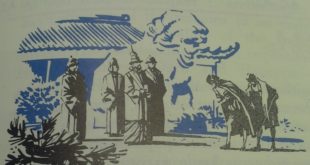In the same way that important ancient civilizations grew out of small beginnings in the valleys of the Nile, the Tigris-Euphrates and the Indus, so another great civilization of Early times — that of China — was cradled in the valley of the Yellow River. To be sure, China’s civilization did not commence as early as did Egypt’s, Mesopotamia’s, or India’s. The ancient Egyptian and the Mesopotamian kingdoms lost their power many centuries ago and early India never became completely united under one empire. China therefore has had a longer national life than any other ancient or modern state. It …
Read More »Tag Archives: Marco Polo
The Powers Carve Up China 1841 – 1914
China, that immense portion of East Asia bounded by the chilly Amur River and the hot jungles of Indo-China, by the Pacific Ocean and the Himalaya Mountains, was the most populous country on earth. For thousands of years, China had had a highly developed civilization. Its people thought of their land as the world itself; to them, it was the Middle Kingdom between the upper region, heaven and the lower region, hell, which was made up of all other lands. They considered foreigners nothing but barbarians. Only a few Europeans had entered China since the Middle Ages and the Chinese …
Read More »The Coming of the Mongols A.D.1135-1368
IN 1135, Hangchow became the capital of the Southern Sung. Thereafter, the Sung kept an uneasy peace with their unwelcome northern neighbours, the Chin. Then, out of Mongolia came the mighty Genghis Khan, whose warriors and their descendants were to spread terror across Asia into Christian Europe and the lands of Islam. Before he died in 1227, Genghis had crushed the Hsi Hsia and all but crushed the Chin. His son, Ogodai, made a treaty with the Sung emperor, and the Sung and Mongol armies together put an end to the Chin. This alliance with a barbarian power turned out …
Read More »Christian Knights and Mongol Horsemen A. D. 099-1404
THROUGHOUT THE eleventh century, the divided Arab Empire became weaker in all its parts. Meanwhile, the Christian lands to the north became stronger. Adventures from northern France snatched Sicily and Southern Italy from the Arabs. The pope called on the rulers of Europe for a united Christian attack on the Moslems. By the end of the century, European knights in chain-mail armour were streaming into Syria by land and sea, determined to recapture the holy places of their religion. This campaign was the first of many. The Crusades dragged on for two centuries, with long periods of peace coming between …
Read More »


